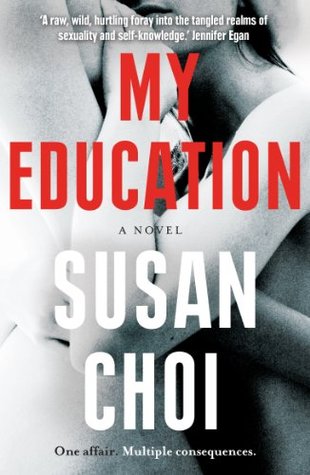Reviewed by Laura Berol
In Susan Choi’s latest novel, the young heroine starts graduate school with an obsession for a Byronic professor and ends up in a torrid romance with his wife. Nights and days in bed, pleasures given and received, pour from the pages like sweet liquor, but this isn’t a book to be skimmed for sex. The same verbal magic that Choi lavishes on coitus also flowers in scenes of drinking, child care, home decoration, and being struck by a parking barrier gate. Like a hallucination, the novel feels more real than reality. And it’s not only in depicting the immediate that Choi shines. Her protagonist’s reflections, both as a young adult and as a mature woman, are utterly convincing and profoundly revelatory. As I read, I felt simultaneously that I’d found the novelistic portrayal of my own past and that I was encountering someone entirely different from me. This book taught me everything I already knew about growing up. Such is the work of literature: to pierce a reader’s shell of habituation to what is obviously, startlingly true.
Other reviewers have faulted Choi for writing a book about bisexual experience without using the term “bisexual.” “Why doesn’t the question of sexual orientation ever arise for this protagonist?” they ask. They conclude that Choi is eschewing the label, sidestepping the controversies of identity politics, avoiding the taint of alliance with a shunned group. Then the reviewers lament that this self-protective behavior has impaired Choi’s writing, cutting it off from the issues that could make it meaningful.
Approaching the novel with such reviews in mind, I came to realize that the questions they posed would never have been suggested to me by the story alone. The narration grows organically from the heroine’s own experiences, and issues of sexual identity are irrelevant to her. The heroine receives her same-sex passion with the matter-of-fact acceptance she shows all her sexual impulses. No explanation is demanded by any of her social worlds, which consist of absent parents, a circle of alcoholic and stoned-out friends, an academic program that “problematizes” all generally accepted categories, and a marriage to which she becomes one of countless subsidiary partners. When the heroine finally grows beyond her love affair, it’s for reasons unrelated to the sex of her lover, reasons having to do with life stages, commitment and parenthood. Her bisexuality is crucial to the story, which wouldn’t exist without it, but the label “bisexual” offers nothing that she needs.
Yet I believe this novel offers much that we in the bisexual community need. Encountering reflections of ourselves in the story, as some of us may do, is an amazing gift, one I searched for throughout my teens and early twenties without success, apart from a few coy scenes in Virginia Woolf. Certainly the library of bisexuality has grown since then, but it is far from reaching its limits. A compelling book like Choi’s can also do much to expand the sympathies of readers who (superficially, at least) have little in common with its heroine. At a deep level, we have everything in common, as My Education reminds us. Like Choi’s protagonist, we all feel the wrench of our desires as they strain against our loyalties, and we all puzzle over the fissures between our past and present selves. The novel teases out these and other conundrums of our shared humanity. Its momentary perceptions and long perspectives give us what we too often miss in the business of living. The most important thing this novel has to communicate is that we do well to treasure life because, if it can be depicted so gorgeously in prose, there must be a lot here for us.
Laura Berol is a writer whose work has also appeared in Believe Out Loud (believeoutloud.com), an online network for LGBTQ Christians and allies.

